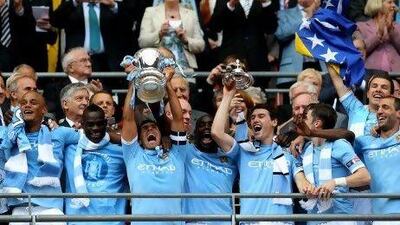It may be a beautiful game, but it's also big business. Revenue at English Premier League clubs passed £2 billion for the first time last year, but soaring wages remain a concern for the world's richest football league.
The 20th Annual Review of Football Finance by Deloitte, a consultancy, reported that Premier League clubs earned £2.03bn (Dh12.23bn) in 2009-2010, a figure expected to rise to £2.2bn in 2010-2011 when new television deals kick in, particularly from emerging markets such as the Middle East.
"The EPL is without question top of the global league table of national leagues in terms of both TV viewers and sponsorship revenue," said Jamie Cunningham, the chief executive of Professional Sport Group.
"Africa, Asia and the Middle East has been core to its success. This is ultimately why it generates more revenue than the other leagues. While Spain only has the big two clubs, the EPL now has the big five, and Tottenham may yet ensure that this becomes the big six. This competition and the marquee international players who play in the EPL are key to its success."
However, the report cautioned that the additional revenue of £49 million was outstripped by the rise in total wage costs of £64m, taking total payroll costs to more than £1.4bn, or 68 per cent of revenues. At that rate, with 1,063 goals scored last season in total, each ball hitting the back of the net cost a whopping £1.4m.
Chelsea had the biggest wage bill (£174m), followed by Manchester City (£133m), which is owned by Sheikh Mansour bin Zayed, marginally ahead of its neighbour and rival Manchester United (£132m).
City's wage bill amounted to 107 per cent of the club's revenue, compared with United, the league champion, whose wages-to-revenue ratio came in at 46 per cent.
Such gaps will have to be closed under Uefa's Financial Fair Play rules, which will seek to make clubs participating in European competition break even by 2011-2012.
"Cost control remains the biggest challenge facing clubs, at all levels of the professional football pyramid," said Paul Rawnsley, a director in the sports business group at Deloitte.
They could also meet the requirements if revenues increase. Mr Rawnsley thinks English Premier League clubs would be able to make the transition to Uefa's financial regulations given the league's standing as the most lucrative in world football.
"Premier League clubs should be well placed to comply with Uefa's regulations, as the Premier League remains the top revenue-generating league in Europe," Mr Rawnsley said.
"Clubs have time to make adjustments to their business plans before the new regulations are effective, as well as increased broadcast revenue from 2010-2011 to help deliver a better balance between spending on players and revenue generation."
The Premier League revenue of £2bn far exceeded any other European league, topping Germany (£1.4bn), Spain and Italy (£1.3bn each) and France (£0.9bn).
Deloitte said net debt at Premier League clubs fell by 20 per cent to £2.6bn in 2009-2010, and the subsequent takeover at Liverpool should reduce that figure further in the next report.
Germany's Bundesliga remains more profitable than England's top flight, with a figure of €138m (Dh740.9m) compared with £83m.
They are the only two of the Europe's top five leagues to record operating profits, with losses in Spain, Italy and France.
Revenue in the Bundesliga grew 6 per cent to €1.7bn, while Germany enjoys the largest average attendance (42,700) in European football.
* with agencies

